Cloud Market share has shown tremendous growth in recent years. The market of cloud computing has boomed exceptionally and has started growing covering a large area of complex technologies, Engineering, products, and customer services.
As a result, it gives birth to a multi-billion-dollar industry where many cloud computing companies compete with each other to expand their cloud market share.
It is also difficult to understand the Cloud market share, cloud ecosystem, navigation, and architecture for end-users or consumers. Outside the cloud ecosystems and giant cloud companies like Google, AWS, and Microsoft. It has become a mystery for most consumers.
In this article, we try to bring you an in-depth analysis of Cloud Market share and try to reveal all the facts about the Cloud market. We will introduce you to the major and leading cloud market shareholders and compare their cloud market share.
In addition to it, we also let you know, who big tech giants are moving to provide cloud computing services, what are its advantages, and how much money they invested. But before that, let me introduce you to three Major Cloud Computing Services.
Before directly hopping into cloud market share, the first thing you need to know about what these cloud companies majorly offer is. In the majority, the leading cloud companies provide you with three main types of cloud computing services. Each one provides a definite range of facilities and, based on that, holds some part of the total cloud market share.
The major Cloud Computing services are:
1. SaaS (Software as a Service)
SaaS is a cloud computing service that mainly focuses on cloud-based software and has a major part in the Cloud market share. The provider will install software on the server and provide access to the users who have subscribed to that software. The users do not need to install the application on their machines. But they can get access to and navigate the software either using a web browser or an API.
Since the software is installed or stored on the server, you only have to store and analyze your data. There is no need to download the software, install it, manage it, or update the software on your machine. Everything is managed and handled by the provider only.
Based on the service SaaS is subdivided into three categories:
1.1. Private Cloud
A Private cloud or a dedicated server where you host your application or software on your server or the intranet. You only be responsible for managing it, upgrading it, updating the software, and using other resources, In addition to it, you will have to set up your security and firewall systems as well.
1.2. Public Cloud
Public cloud service is where the Provider installs the software on the server and gives access to their subscriber to use the software. The provider will be responsible for all the management, upgrades, maintenance, and security. This is what the majority of Cloud computing companies provide.
A public cloud is where the provider supplies you with access to its data center infrastructure. They are responsible for all management, maintenance, security, and upgrades.
1.3. Hybrid Cloud
A hybrid cloud is a mixture of both private and public cloud solutions. It means You will be in charge of handling and managing, the two public and private services altogether, mainly focusing on passing the data between both cloud services securely.
2. IaaS (Infrastructure as a Service)
IaaS from the name itself suggests this Cloud service is mainly focused on infrastructure. The provider will provide you with all the resources such as servers, storage capacity, and networking on demand. And as a user, you have to build your platform and run the application on it. This cloud service gives users the flexibility to choose resources of their own and can also upgrade as per their needs in the future.
3. PaaS (Platform as a Service)
PaaS is the third and last sub-category of SAAS which offers cloud computing, where the provider allows you to use their cloud services such as managing, developing, and testing applications. Along with it, they provide you with all sorts of tools through the platform to run tests and development.
However, the provider’s main role is to ensure security, maintenance, and backups of the infrastructure.
Read: 🚩 WordPress Market Share: Updated Stats
According to the leading research website grand view research, the worldwide computing market size has been estimated to a worth USD 368.97 billion in 2021. And it has been expected to grow at a rate of 15.7% from the year 2022 to 2030.
All these can be possible due to tremendous advancements in technology such as Machine learning and AI. Cloud computing services and the maximum cloud market share have now been shifted to AI capabilities. Since the COVID pandemic, business managers and employees have chosen to work from home or remotely and it has become the latest trend that doesn’t seem to end shortly.
Due to the pandemic, there has been a great transformation in the workplace and Work culture. In addition, the pandemic also shapes the business model with the technologies that adapt to the changes such as the Internet of Things, Artificial intelligence, mobile computing, etc.
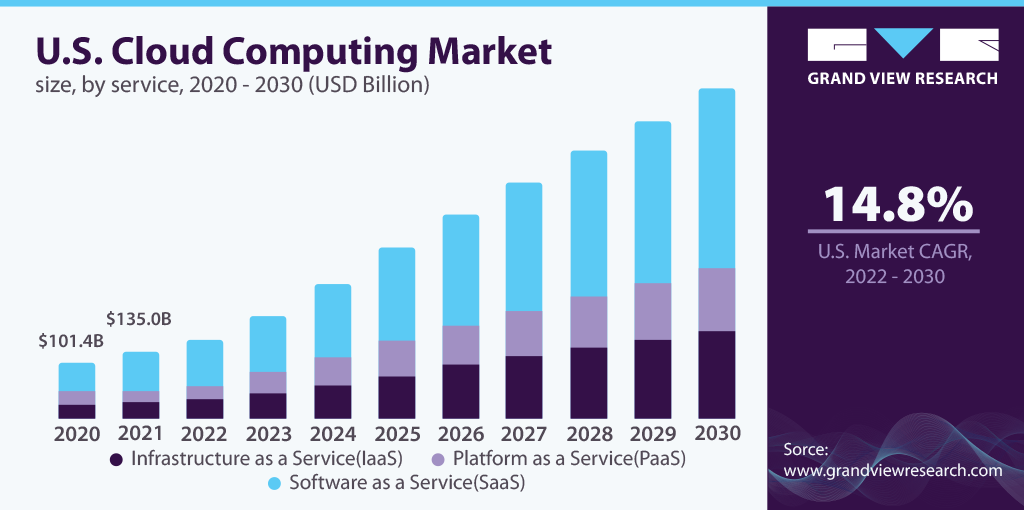
The cloud computing market accelerated the demand in Q3 2020 as organizations continued to migrate their workloads from traditional channels to digital formats. The fundamental driving forces for the market are consumerization of IT, diverse landscape of suppliers, new requirements of agile IT thinking, higher availability of skilled workforce, increased awareness of the benefits of cloud computing, government initiatives in support of adopting cloud computing, a rise of emerging technologies, and rapid increase in the number of start-up ecosystems.
Read: 🚩 AWS Market Share: How Far It Rules the Cloud Industry?
It has been observed that the public cloud market around the world comprising Software as a Service (SaaS), Infrastructure as a Service (IaaS), and Platform as a Service (PaaS) has shown positive growth of 29.0% in the year 2021. As per the reports by IDC (International Data Corporation), these services have generated about $408.6 billion in revenue worldwide in 2021.
Combining all the revenue generated by the top five Cloud market shareholders, Amazon, Google, Oracle, Microsoft, and Salesforce, in 2020 they hold about 40% of the worldwide earnings. And it is increasing by 36.6% year over year. This is all possible due to the spreading of SaaS and IaaS services that made Microsoft, as well as Amazon, become top contenders in the cloud market share with 14.4% and 13.7% shares respectively.
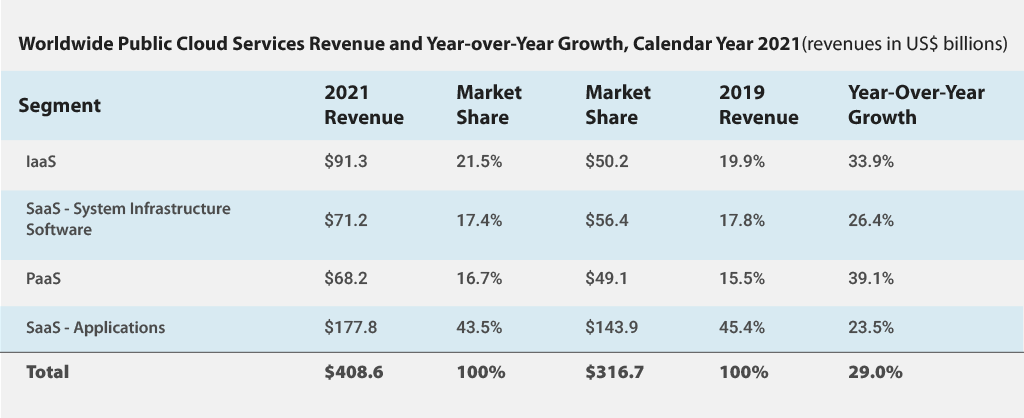
From the above table, it is visible that the results combining IaaS, SaaS, and PaaS are the basic cloud services, that big SaaS companies and customers use to run, transform build, and manage different applications on shared public clouds.
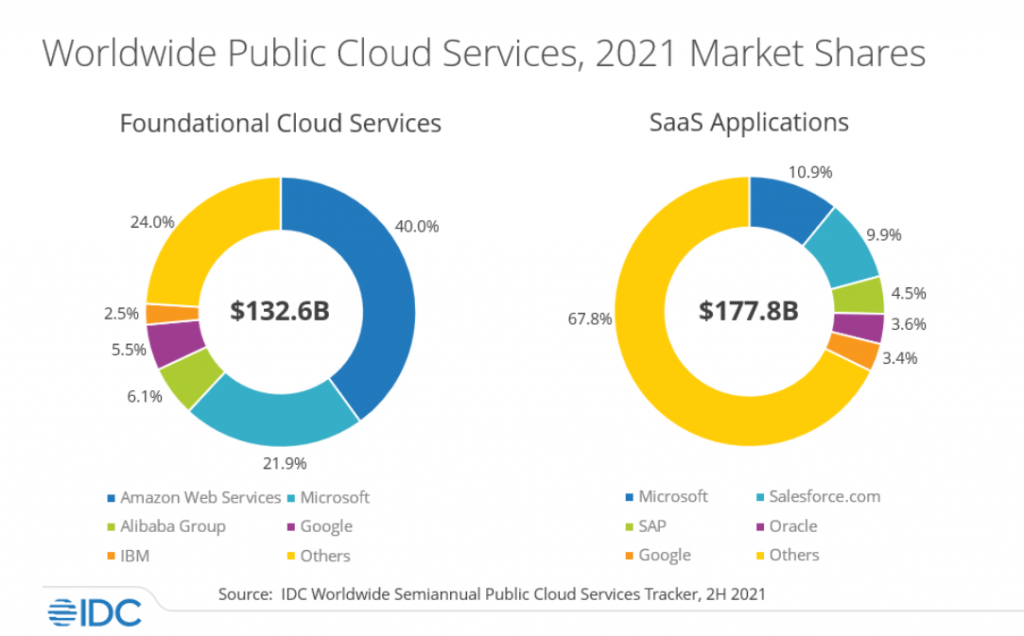
In addition, by combining the cloud services such as IaaS, PaaS, and SISaaS cloud market, the top 5 cloud companies, Google, AWS, Microsoft, IBM, and Alibaba hold more than 60% of total revenue globally.
As per the latest data published by Statista (a worldwide market share of leading cloud infrastructure service providers) in the second quarter of 2022. Amazon Web services have become an early leader in the market for cloud infrastructure.
As per the close estimation done by Synergy Research Group, Amazon will be leading the worldwide cloud infrastructure market share by 34 % in Q2 2022. It will be surprising to see Amazon’s market share surpassing the combined market share of its two biggest competitors Microsoft Azure and Google cloud platform.
By the second quarter of 2022, the global cloud infrastructure revenue will reach about $203.5 billion USD. Amazon and Microsoft combined are responsible for generating more than half of the total cloud infrastructure revenues.
The Chart shows the data of about 500 cloud market share companies from 49 countries around the world.
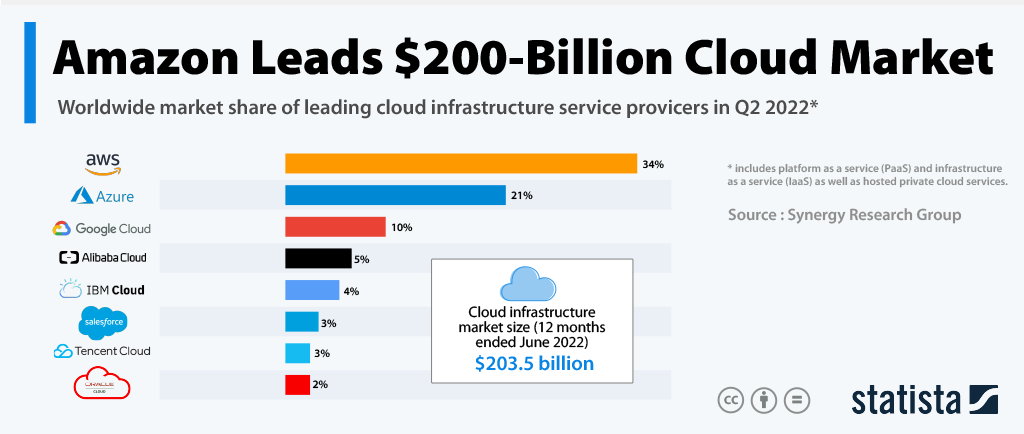
Read: 🚩 Cloudflare Market Share [Statistics & Report]
1. 1st Leading Cloud Market Share- Amazon Web Services (AWS)
According to the leading statistic website statistics, Amazon Web services’ market share is leading with 34% of the world’s IaaS+PaaS+SaaS cloud market. Hence, Amazon Web Services turned out to be a clear market leader in the first quarter of 2022. As per the reports by Statista, AWS (Amazon Web Services) generated cloud computing and hosting revenue of $18.5 billion for Q1 2022.
2. 2nd Leading Cloud Market Share- Microsoft Azure
Microsoft Azure has a cloud market share of 21% and it has increased its revenue by 50% over the previous quarter. which is quite impressive compared to the 46% growth analysts anticipated. Microsoft’s cloud computing business Azure provides Intelligent Cloud services which show a growth of about 26% to $20.9 billion that includes servers and cloud services.
Microsoft’s soul of success was its cloud computing business. Even Microsoft CEO Satya Nadella said, ” We’re seeing more customers move their mission-critical workloads to Azure.”
Even Azure has not specified its specificity which frustrates many experts, and hence it cannot be simply compared with Amazon Web Services. Due to this many experts showed concern about How Azure is still doing great.
Whatever the reason is, you cannot ignore the fact that Microsoft’s cloud computing business is generating good profits for the company.
3. 3rd leading cloud market Share- Google Cloud Platform (GCP)
In the 2022 second Quarter, Google Cloud reportedly generated a revenue of $6.3 billion and had a 10% cloud market share. Which is quite an impressive increase of 35% year over year. It is also to be noted that Google Cloud includes not only the Google Cloud platform but also Google Workspace.
On the other hand, Google’s parent company Alphabet reportedly generated overall revenue of $69.7 billion. This comprises all the Google search and other advertising activities, such as YouTube which generated about $7.4 billion and the whole of Google’s other advertising network contributed about $8.3 billion.
4. 4th leading cloud market share- Alibaba
Owning a 5% public cloud market share according to Parkmycloud, Alibaba has generated revenues of $11.7 billion USD worldwide at the end of the fiscal year 2022, which is an impressive growth of 23% year over year. Alibaba also mentioned that the reason behind the slower revenue growth rate during the quarter is mainly due to payments declined by the top cloud customers.
This Top cloud customer has a great reach outside China that used Alibaba’s cloud service in the past. However, it has decided to terminate the contract only for its international business due to non-product-related requirements. Even Alibaba believes that in the future their other customers will be so diversified with cloud computing, that they won’t get affected much by a single customer.
5. IBM
On the other hand, IBM Cloud will own only 4% of the Cloud Market Share by the end of June 2022. It has been observed that IBM Cloud generated revenue by 20%, whereas RedHat’s revenue has increased by 18%. However, the overall IBM revenue has been going down by 4.5%.
In the year 2020, IBM acquired seven small companies whose main focus was AI and hybrid cloud.

Why Cloud computing has attracted Businesses?
Businesses are attracted to Cloud Computing for various unique reasons. But even, some reasons match with almost every business, that opts for their companies to make the transition. Here are some of the most common reasons why businesses are getting attracted to Cloud Computing.
1. Add value to your Business
Cloud Computing offers a wide range of offers to a Business that adds value to it. It provides businesses with greater flexibility, scalability, and security. However, there are a lot more benefits that you will go to see in the next section.
2. Events that happen to be terminated
No matter which product you have, either digital or physical, all of them have a typical lifecycle. Hence, whenever a seller has announced to terminate their products, then it becomes an opportunity for you to consider alternative solutions. Hence, due to these naturally occurring events, businesses are moving from one premise to more reliable cloud-based solutions.
3. Business merger or Acquisition
When a company turns over or acquires another company or merges, the main challenging part that arises for them is the compatibility issues. Different companies use different technologies and applications, and it becomes tough for both companies to match all technical parameters.
Hence, if you ever come across such situations, the best and the right solution left for you is to migrate all applications and technologies to the cloud platform. By doing this, you can offer your employees a smoother and more seamless ecosystem.
4. Contract Renewals
Many businesses have contracts with private data centers, hardware, and software providers that must be periodically renewed. Much like an end-of-life event, this presents you with an opportunity to reconsider how you deploy specific services and solutions.
Increasing cost bases and a range of other limiting factors present you with the opportunity to make the transition to a more cost-effective cloud-based solution.
5. Capacity Requirements
If you are running a business that utilizes hardware, then it is obvious that you will face issues when there is a surge in growth or experiencing huge seasonal shifts. Due to this demand will be high and the cost will rise, and you will end up paying more money on services that are not even utilized properly.
When you shift your business to the Cloud platform, it will give you the option to either increase or decrease computational power instantly. And the price will depend solely on the model you chose.
6. Software and Hardware Updates
If you are setting up an in-house hosting data center or software application, you will be responsible for managing it and keeping it fresh or up to date. In-house updating software or hardware is usually less expensive and it is highly beneficial when you shift to the cloud ecosystem.
For example, a public SaaS subscription eliminates all the unnecessary hardware upgrades and very expensive software licenses.
7. Data Compliance
Data compliance is one of the foundations for any business operation. Especially if you are into healthcare service providers or financial industries. If you are shifting your business to Cloud computing, it will provide you with the freedom to choose those services that are already in compliance.
8. Protection from cyber attacks
Since the increase in business migration to online platforms, cyberattacks and hackers have become active. Their attack might be severe and can damage your whole website to the extent that it cannot be restored. You might even find your business to be vulnerable and also at risk of these cyber-attacks.
No matter, if they do not have enough tools or intellect, you will still find secure web hosts or cloud platforms that provide you with an inbuilt solution to lower the risks.
Advantages of Shifting to Cloud Computing Services in terms of Business
As far as now, I have tried to cover all the major common reasons for any business to consider moving to cloud computing. Now let us check out more advantages of shifting to cloud computing in terms of business.
1. Saves money
One of the main reasons to move to cloud services is it helps to save money. Depending upon the type of business you use and how efficiently you utilize cloud resources, you can save money through cloud computing in various ways.
For example, Cloud computing helps you to automatically scale according to changes in demands, supply, and many more.
2. Easy to scale
Another key advantage of shifting to cloud services is its ability to scale. Cloud computing lets you easily scale up computational as well as storage demands whenever necessary for the business. It is based on whatever you pay that much you will receive, It means to scale up your computer and store you will be required to pay more, hence it is better if you control your costs and scale up or down only when it is utmost necessary or the demand.
3. Continuous Operational
A major factor for your business to be successful and ahead of its competitors is to provide service even if there is any disaster that occurs. Your technology must be operational anyhow. No matter how much you control your business processes, there are always high chances that it will let you down. Due to high competition and demand, even a slight downtime can seriously impact your business and hence its reputation, productivity, and finally revenue.
In addition, cloud computing technology provides overall protection from any kind of contingency, that can harm data loss and failure of vast data centers.
4. Edge over the competitors
When you are running a business, you have limited resources for your IT team but when you decide to move to Cloud services, it helps your business to run more smoothly and quickly than competitors.
You can let your IT team focus more on the business and work on different projects that create revenue rather than working in a room depending on the in-house infrastructure resources.
5. It is easy to do business and access data from anywhere
Cloud computing helps your business team members and employees be well connected through a loop no matter where they are located in the world. By providing remote access, cloud services give your employees the ability to work on your business projects remotely and access data via any IT device. It helps to encourage remote working and also ensures the maintenance of productivity as well as connectivity of the employees while they are on the move.
6. Quality Control
Quality is everyone’s business’s sole backbone, if you compromise on that your business will no longer survive. Similarly, no business should tolerate any lack of quality and inconsistent reporting. Cloud services can help you to prevent such by keeping all the information and important documents in a single format in one place. These services also offer data backups as well as version control, providing your employees with the exact information without disturbing accuracy and consistency.
7. Sustainable Development
Since the new industries have emerged vigorously, it has been a matter of concern for the environment as well. Hence, it has become a top priority for any business to consider sustainable resources as an alternative so that they can help to lower the carbon footprint. Some Businesses are also implementing this by supplying renewable energy in their data centers.
Using cloud services, businesses can also opt for virtual services and dependency on hardware or physical products. In addition to it, cloud computing also provides employees mobility and remote accessibility, which helps to reduce on-premises emissions.
8. Comprehensive
Due to digitalization, everything has become digital and eliminated manual records on paper. It has become easy to track, monitor, and examine countless data points that are related to your customer’s behavior, such as interactions and transactions with your company. It is also true that analyzing the whole customer data is not an easy task and a time-consuming process.
Now, the right cloud service provider can provide you with a strong infrastructure, powerful computing, and storage options integrated with analytics tools that help speed the process and work efficiently. It is all due to the introduction of AI and technological advancements that happened recently.
9. Increases Business relationships
Cloud computing provides an easy and smooth platform for your business collaborations. These platforms provide your business team members with the opportunity to interact, create, view, edit, and share information or data easily with protection. In addition to it, the ability to remotely connect and mobility lets your team connect whenever and wherever they are located.
10. Threat protection
Other than the advanced features that cloud computing offers, threat protection, and security are also their utmost priority. In which they offer your business a vastly improved security solution. For example, big tech giants like Microsoft monitor and stop millions of potential threats or attacks on a regular basis, and they have dedicated in-house security experts who continuously take an eye on every possible security threat. Hence when your business moves on a Cloud platform, your security and protection are all responsible to your cloud provider so that you can freely focus on your business development.
11. Price or Cost Comparison for AWS, Azure, and Google Cloud Platform
If you are looking to migrate your Business to public cloud infrastructure, the first and most important step is to find the right cloud service provider with reliable pricing. However, it is not as easy as it seems, the price of cloud computing services is simple and can vary on various parameters. such as:
- The amount of storage you will require.
- Configurations and specifications of servers you want to set up.
- Operating system and type of software you are going to install.
- Pay cycle (either per minute, hour or by month)
- Choose a one-time contract or pay-as-you-go
- Data center locations
These are just common parameters, however, the leading cloud market shareholders such as Google Cloud Platform, Amazon Web services, and Azure offer you hundreds of different services. Each one of them changes the price as you choose the configuration of customizing it as per your requirements.
To help you out the leading cloud market shareholders have variations in their pricing for the same service (combined public cloud hosting, installation of servers, and storage). To make it easy for you to compare the prices of different leading cloud market shareholders provides you with the same parameters. I have used Cloudorado, a cloud hosting comparison tool that lets you choose basic configurations or specifications such as RAM, CPU, storage, and Operating system.
These Basic configuration settings will help you to analyze their pricing per month.
For example, let us take a basic configuration such as:
- CPU of power 8
- RAM to be 5Gb
- Operating System to be Windows
- Storage capacity to be 2 TB.

From the above comparison, you can clearly see that Microsoft turned out to be the most economical option, It is due to if you have opted for Windows which is Microsoft’s operating system. But when you change the operating system from Windows to Linux, Google will turn out to be the most economical option.
It is obvious that the above price comparison is just basic and only for your reference. However, if you go deeper into each cloud service provider, you will find hundreds of customization options, offers, and discounted models, that you can choose from hence varying the pricing.
If you are well known about your Installation requirements and want to estimate the cost, each of the leading cloud market shareholders has its own calculator. That helps you out in estimating costs for your cloud computing services.
Whatever the estimated costs for your cloud computing services, WPOven provides you with the Best WordPress VPS hosting experience under the budget and without any compromises.
Summary
For you as a customer, cloud computing has dramatically changed the whole IT market, by providing you with a vast range of competitive services at reasonable price offerings. But to get the maximum benefit out of it, you are required to have the in-depth knowledge to explore almost every option available in the market.
In addition to it, you are also required to have the willingness to optimize your cloud installations to make them cost-effective. Considering all the major Cloud services whether it is, SaaS, PaaS, or IaaS, the leading cloud market shareholders will be Amazon (AWS), Google (GCP), and Microsoft (Azure) which continue to dominate. It has also been observed that continuous research and development also lead to dominance in the near future as well.
While, if you are planning to shift to cloud services, you must analyze, research, and collect all the information regarding the offers these leading Cloud market shareholder companies have to offer in their competitive price ranges. Spending time to figure out the most suitable cloud services for your business will be worth it for you to optimize the price and make your installation cost-effective.
Whereas the Google Cloud platform is considered one of the reasonable and cost-efficient Cloud market shareholders, it is also one of the fastest-growing ones. They are continuously researching and taking innovative steps to enhance their performance, and also provide reasonable discounts.
I hope the above-detailed article on Cloud market share will help you to understand which provider has the maximum shareholders. And if you have any experience with these cloud services, please do share your valuable input with us in the comment section below.
Save your time, money, and resources, and give your website mammoth growth with WPOven’s managed WordPress hosting for agencies.
- 24X7 WordPress Expert support
- Cloudflare integration
- High-end Security
- Datacentres around the world, etc.
You can have all these features and much more in a single plan with unlimited Free migrations, unlimited staging, and a 14-day risk-free guarantee. Check out our plans or contact our support team which assist you in choosing the right plan.
Frequently Asked Questions
Who has the biggest cloud market share?
Owing to almost half of the cloud market share, Amazon became the leading cloud market shareholder. Amazon Web Services become a clear market leader in 2022. As per the reports by Parkmycloud, AWS (Amazon Web Services) generated a revenue of $13.5 billion for Q1 2021. AWS revenue grew 32% in the quarter, accelerating from 28% growth in the fourth quarter.
What percent of the cloud market is AWS?
In 2021, AWS leads the $150 billion cloud market share by 32%.
What are the 3 types of cloud services?
There are three major types of cloud services that hold the maximum cloud market share:
1. IaaS (Infrastructure as a Service)
2. PaaS (Platform as a Service)
3. SaaS (software as a Service)

Rahul Kumar is a web enthusiast, and content strategist specializing in WordPress & web hosting. With years of experience and a commitment to staying up-to-date with industry trends, he creates effective online strategies that drive traffic, boosts engagement, and increase conversions. Rahul’s attention to detail and ability to craft compelling content makes him a valuable asset to any brand looking to improve its online presence.

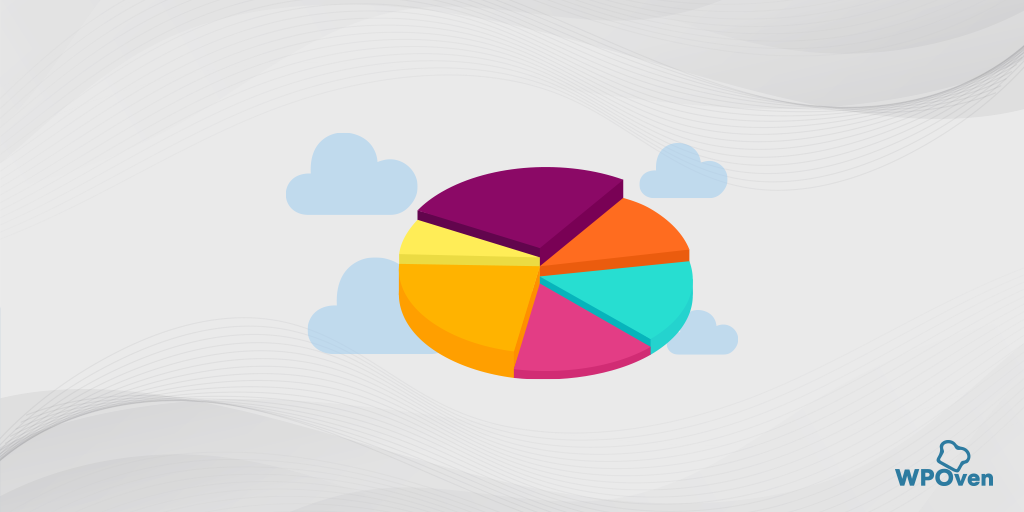
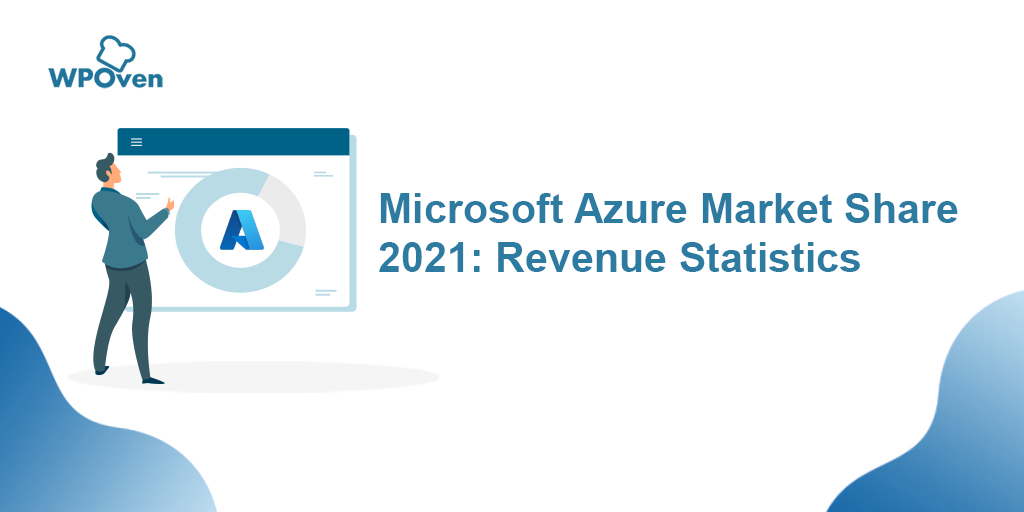
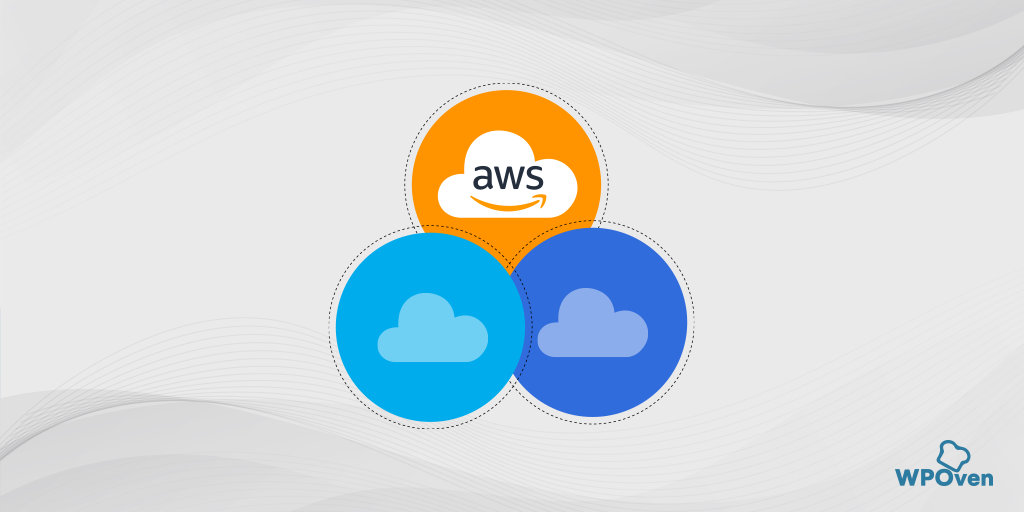
![Cloudflare Market Share [Statistics & Report] Cloudflare Market Share](https://www.wpoven.com/blog/wp-content/uploads/2023/01/Cloudflare-Market-Share.png.webp)
![Wix Market Share 2023 [Detailed Statistics] wix market share](https://www.wpoven.com/blog/wp-content/uploads/2021/10/Wix_market_share.png)


